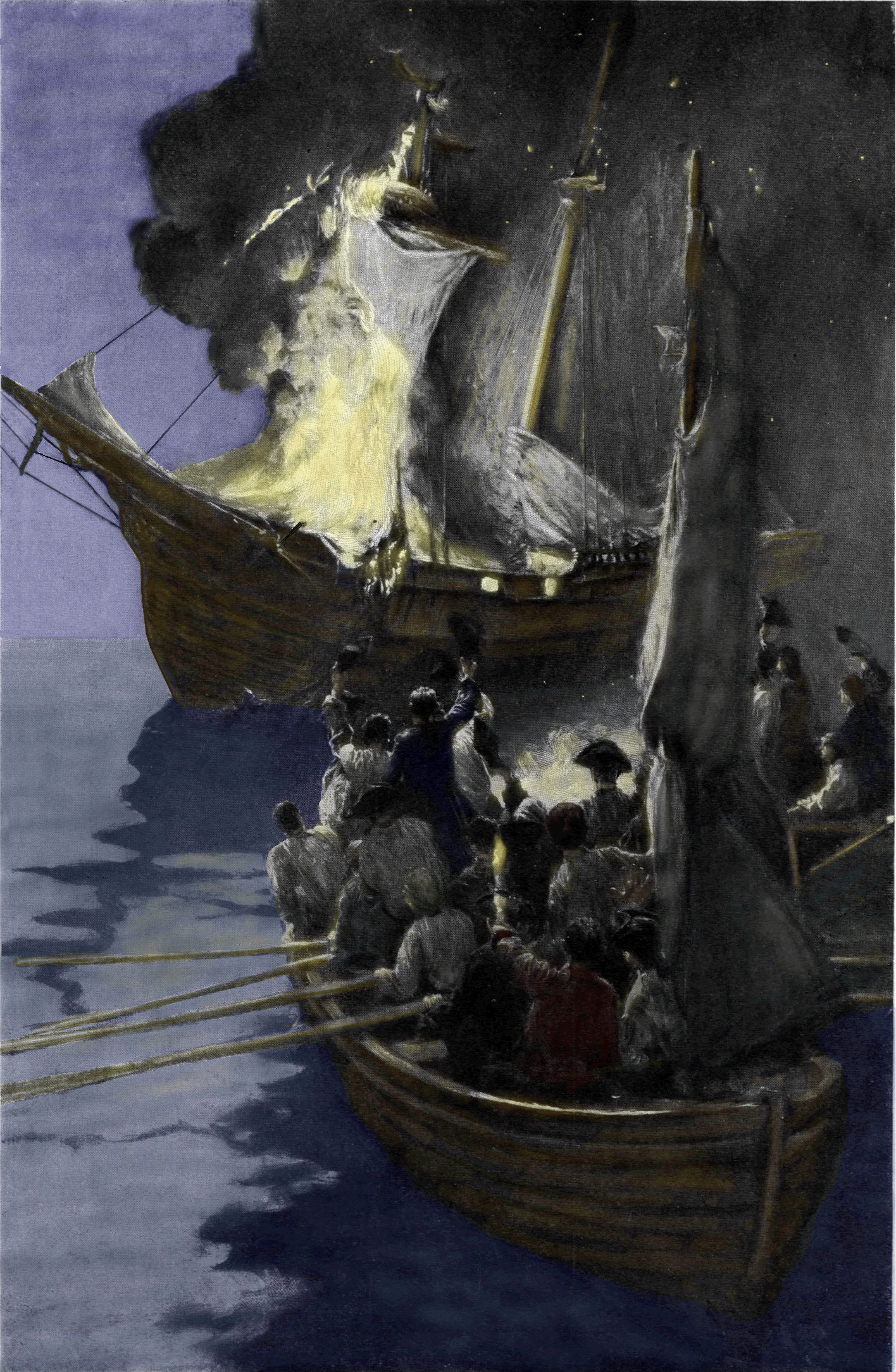Gaspee Virtual Archives Virtual Archives |
| What's the Importance of the
Gaspee Affair? Dr. John Concannon
Webmaster Gaspee Virtual Archives |
 Most people know quite well
the story of the burning of the Gaspee.
But have you ever wondered why we know it as the
"Gaspee Affair" rather than simply the "Burning of
the Gaspee?" It’s because
that spark that started the American Revolution had
little to do with the actual lighting of that
British ship on fire. Rather, it was the
overzealous British reaction to this incident which
stirred the furor of American patriotism — in a much
broader and more important way. Most people know quite well
the story of the burning of the Gaspee.
But have you ever wondered why we know it as the
"Gaspee Affair" rather than simply the "Burning of
the Gaspee?" It’s because
that spark that started the American Revolution had
little to do with the actual lighting of that
British ship on fire. Rather, it was the
overzealous British reaction to this incident which
stirred the furor of American patriotism — in a much
broader and more important way. Left: Burning of the Gaspee by Howard Pyle (1853-1911) from Harpers New Monthly Magazine, No 399, August 1883. Kellogg Library. (colorized c2013, Gaspee Days Committee) The British had sent HMS Gaspee into Narragansett Bay to enforce maritime trade laws. Rhode Island citizens had long avoided such regulation by simply smuggling their shipped goods into and out of our local ports. To rid the waters of this new nuisance, prominent local citizens lured the Gaspee aground in June of 1772, shot and wounded its commanding officer, captured the crew, and burned the schooner to its waterline. King George III and his ministers were furious at this threat to their colonial powers. In addition to offering a huge reward to those that would turn in any of the raiders, the British appointed a commission of inquiry to further investigate the matter. But to the credit of Rhode Islanders, no one seemed to know anything when called to testify. This threat to colonial rights greatly incensed American leaders and set off a chain reaction starting with Virginia, followed quickly by all other Colonies, to create the permanent Committees of Correspondence and to suggest the First Continental Congress. Thus began the political and ideological movement from a collection of single, independent British colonies towards a unified American country. Thomas Jefferson, a member of the Virginia Houses of Burgess at the time, recollected the events in his autobiography1: Nothing
of
particular excitement occurring for a considerable
time; our countrymen seemed to fall into a state of
insensibility to our situation. The duty on tea had
not yet been repealed, and the Declaratory Act of a
right in the British parliament to bind us by their
laws in all cases whatsoever, still suspended over
us. But a court of
inquiry held in Rhode Island in 1772, with a power
to send persons to England to be tried for offences
committed here was considered at our session of the
spring of 1773 as demanding attention. …. We were
all sensible that the most urgent of all measures
was that of coming to an understanding with all the
other colonies to consider the British claims as a
common cause to all, and to produce a unity of
action, and for this purpose that a committee of
correspondence in each colony would be the best
instrument for intercommunication, and that their
first measure would probably be to propose a meeting
of deputies from every colony at some central place,
who should be charged with the direction of the
measures which should be taken by all. We therefore
drew up the resolutions ….
The Gaspee Affair also
played a very large role in the media coverage that
drove the spirit for independence in the years just
prior to the Revolution. Newspaper accounts of
the attack on the Gaspee and the subsequent
commission of inquiry were front page news not only
within the colonies themselves, but across the
Atlantic in Britain. The Gaspee Affair was also the
subject of a very influential pamphlet, An
Oration on the Beauties of Liberty, written by
Rev. John Allen of Boston. This pamphlet was
often quoted by John Adams, James Otis, and other
Revolutionary leaders, and was among the most
published pamphlets during the pre-Revolutionary
years. When the time came to cut
ties with the Mother Country, the American
leadership assembled in Philadelphia in July of 1776
drew up a list of grievances against King George
III. Included in the Declaration of Independence
were some grievances that were directly attributable
to the Gaspee Affair2: "He has
combined, with others, to subject us to a
jurisdiction foreign to our Constitution, and
unacknowledged by out laws; giving his assent to
their acts of pretended legislation. .... For
depriving us, in may cases, of the benefit of trial
by jury; For transporting us beyond the seas to be
tried for pretended offenses:" One can forever argue the
point of which Colonial fracas against the British
was the earliest. But as to the first shot, it
depends on when you define the 'start' of the
Revolution. We're not talking here of formal
armed Revolution—we will happily cede that to
Lexington and Concord. We're talking instead
about the idealogical revolution for independence
from Great Britain. For as John Adams said, "The
Revolution was effected before the War commenced.
The Revolution was in the minds and hearts of the
people." |
| Back to Main Page |